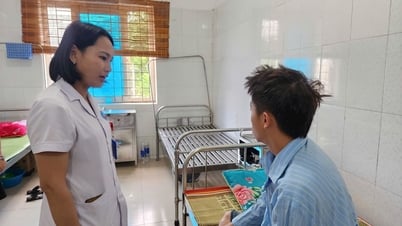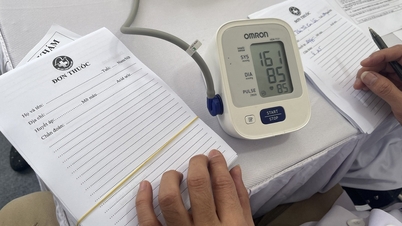
Doctor Nguyen Thi Hoa, Institute of Mental Health, examines a patient - Photo: DUONG LIEU
According to doctors at the Institute of Mental Health (Bach Mai Hospital), recently many children have been hospitalized for psychosis and schizophrenia in severe condition because their families did not recognize the symptoms early or stopped taking their medication on their own, making treatment more difficult.
Confusing "dreaminess" with psychosis
Doctor Vuong Dinh Thuy said the hospital had just admitted a 14-year-old patient with severe psychosis, agitated behavior, and always thinking that someone was harming him.
The patient is a 9th grader, good at studying but under a lot of pressure to study, has high expectations for himself. His mother said that since 6th grade, he had shown signs of sitting alone, smiling, and mumbling. Because of his good academic results, the family was complacent and did not take him to see a doctor.
About a year before being admitted to the hospital, the patient began to have trouble sleeping, talked to himself, and thought his friends were gossiping about him. Although the doctor prescribed medication, the family stopped taking it because they were worried about the side effects.
In the past three months, the condition has become more serious: auditory hallucinations, incoherent speech, breaking things, and even hitting people. The family was forced to take the child to the emergency hospital.
At the hospital, the child was diagnosed with agitated psychosis due to schizophrenia. Doctor Thuy emphasized that the child had shown early signs such as talking to himself, setting high expectations...
This is a warning sign of schizophrenia, but parents think it is due to teenage psychology, causing the disease to not be treated promptly and become severe.
Risk factors and early warning signs
Dr. Nguyen Thi Hoa said psychosis is common in adolescents, and rarely occurs before the age of 12.
Some risk factors that increase the likelihood of developing the disease include: a family history of mental disorders or carrying related genes; obstetric complications during pregnancy or birth; childhood psychological trauma; low IQ (below 85); use of stimulants such as marijuana, especially before age 15; difficult living environment and low education level.
Dr. Hoa advises parents to take their children to see a doctor early if they see their children saying or hearing things that are not true but are still aware that it is a subjective experience, or if there are sudden changes in behavior, personality, or academic performance.
"Children will be comprehensively assessed regarding their medical history, living environment, education and related factors. If they are sick, early intervention will prevent the disease from progressing and increase the chance of successful treatment," Dr. Hoa emphasized.
Dr. Ngo Van Tuat, Institute of Mental Health, said that with schizophrenia, patients must maintain medication for life. If used as prescribed, they can still live, study, and work normally.
"However, stopping the medication on your own can easily cause the disease to relapse, often more severely. Many families are afraid of side effects so they stop taking the medication, this is a dangerous mistake," Dr. Tuat warned.
Source: https://tuoitre.vn/canh-bao-loan-than-o-tre-dung-nham-lan-voi-tinh-cach-mong-mo-20250915181440796.htm







![[Photo] Science and Technology Trade Union honors exemplary workers and excellent union officials](https://vphoto.vietnam.vn/thumb/1200x675/vietnam/resource/IMAGE/2025/9/17/842ff35bce69449290ec23b75727934e)
![[Photo] General Secretary To Lam chairs a working session with the Standing Committee of the Government Party Committee](https://vphoto.vietnam.vn/thumb/1200x675/vietnam/resource/IMAGE/2025/9/17/cf3d855fdc974fa9a45e80d380b0eb7c)


































































































Comment (0)